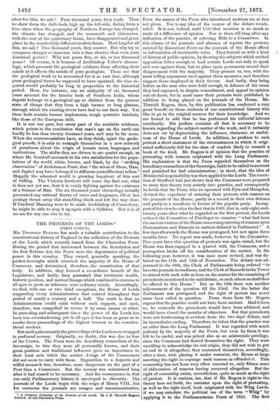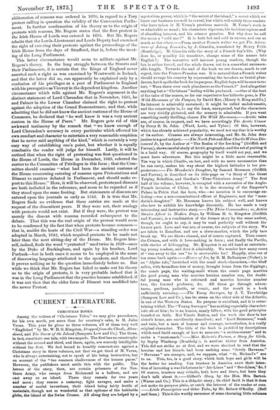THE PROTESTS OF THE LORDS.*
[FIRST NOTICE.]
MR. TTIOROLD ROGERS has made a valuable contribution to the constitutional history of England in the collection of the Protests of the Lords which recently issued from the Clarendon Press. During the period that intervened between the Revolution and the first Reform Act, the Peers were the depositaries of political power in this country. They owned, generally speaking, the pocket-boroughs which returned the majority of the House of Commons, and determined, therefore, the constitution of that body. In addition, they formed a co-ordinate branch of the Legislature, and lastly, they possessed that territorial wealth, historic position, and ancient lineage which combined to exercise in all ages so great an influence over ordinary minds. Accordingly, we find, with one or two brief exceptions, the House of Lords supporting every Administration that existed throughout that period of nearly a century and a half. The truth is, that no Administration could exist without such support, and each, therefore, was compelled to secure it by some means or other. In preceding and subsequent times the power of the Lords has been less overshadowing, yet in all ages it has been so great as to render these proceedings of the highest interest to the constitu- tional student.
But until quite recently the proceedings of the Lords were wrapped in profound secresy. Originally, no doubt, this was due to fear of the Crown. The Peers were the hereditary counsellors of the Sovereign, to him they were all personally known, and their great position and traditional influence gave an importance to their least acts which the noisier doings of the Commoners did not seem to carry with them. Opposition to a despotic and wilful monarch was, therefore, more dangerous on the part of a Peer than a Commoner. But the secresy was maintained long after it had ceased to be necessary. And the consequence is, that our early Parliamentary history is enveloped in obscurity. The journals of the Lords begin with the reign of Henry VIII., but for centuries the journals are meagre and uncommunicative.
• d Complete Cotlasttott of the Protests of Use Lords. By J. E. Thorold Rogers. Oxford: at the Clarendon Press. Even the names of the Peers who introduced motions are at first not given. Nor is any idea of the course of the debate vouch- safed. It is not, indeed, until 1540 that mention is so much as made of a difference of opinion. Nor is there till long after any indication of the practice of referring Bills to a Committee. In this silence of the journals and absence of reports the protests entered by dissentient Peers on the journals of the House afford us information of inestimable value. They furnish us with a kind of history of public opinion, by showing the subjects which excited opposition bitter enough to lead certain Lords not only to speak and vote against them, but to place upon permanent record their disagreement with the majority. They present us, too, with the most telling arguments used against those measures, and therefore suggest those employed in their favour. And lastly, they bring before us the men who were bold enough, in defence of the cause they had espoused, to despise concealment, and appeal to opinion out-of-doors, for in most cases their protests were published, in addition to being placed on the journals of the House. Mr. Thorold Rogers, then, by this publication has conferred a very great benefit on those students of our constitutional history who like to go to the original sources for their knowledge. And we are bound to add that he has performed his editorial labours excellently. His Preface contains all that is necessary to be known regarding the subject-matter of the work, and it certainly does not err by depreciating the influence, character, or useful- ness of the House of Lords. In addition, he prefixes to each protest a short statement of the circumstances in which it origi- nated sufficiently full for the class of readers likely to consult a book of the kind, Mr. Rogers is of opinion that the practice of protesting with reasons originated with the Long Parliament. His explanation is that the Peers regarded themselves as the hereditary counsellors of the Sovereign, liable to be called to account and punished for bad administration ; in short, that the idea of Ministerial responsibility was then applied to the Lords. The execu- tion of Strafford had just shown that the Commons were prepared to carry that theory very strictly into practice, and consequently he holds that the Peers, who co-operated with Pym and Hampden, devised the expedient of entering their protests with reasons on the journals of the House, partly as a record in their own defence and partly as a manifesto in favour of the popular party. In sup- port of this view he cites the fact that in 1669, that is, only eight-and- twenty years after what he regarded as the first protest, the Lords ordered the Committee of Privileges to examine "what had been the ancient custom of the House concerning entering of reasons upon Protestations and Dissents to matters debated in Parliament." A few days afterwards the House was prorogued, but met again three months later. No report was made, however, by the Committee. Five years later this question of protests was again raised, but the House was then engaged in a quarrel with the Commons, and a prorogation broke off the consideration of the matter. In the following year, however, it was once more revised, and was de- bated on the 11th and 15th of November. The debate was ad- journed to the 18th, the Clerk of Parliaments being ordered "to have the journals in readiness, and the Clerk of Records in the Tower to attend with such rolls as bear on the matter for the examining of precedents mentioned in the said debate, or such others as shall then be offered to this House." But on the 18th there was another adjournment of the question till the 22nd. On the latter day Parliament was prorogued, and the right of protest has never since been called in question. From these facts Mr. Rogers argues that the practice could not have been ancient. Had it been so, he contends the precedents would have been adduced, and would have closed the mouths of objectors. But that precedents were not forthcoming is evident from the two days' debate, and its inconclusive ending. Therefore, he infers that the practice was no older than the Long Parliament. It was regarded with much jealousy by the majority of the Peers, but even by them it was felt to be useful, and was prized also as an aristocratic privilege, since the Commons had denied themselves the right. They were unwilling to acknowledge its real origin, they did not wish to put an end to it altogether, they contented themselves, accordingly, after a time, with placing it under restraint, the House at large asserting the right to expunge such reasons as offended it. This censorship has not been very often resorted to, only fifteen cases of obliteration of reasons having occurred altogether. But the right of censorship exists, nevertheless, quite as much as the right of protest. It is curious, too, that if Mr. Rogers is right in the theory here set forth, the restraint upon the right of protesting, as well as the right itself, both originated with the Whig Lords, if we may antedate, the political use of the term "Whig" by applying it to the Parliamentarian Peers of 1641. The first
obliteration of reasons was ordered in 1690, in regard to a Tory protest calling in question the validity of the Convention Parlia- ment. In further confirmation of his theory as to the origin of protests with reasons, Mr. Rogers states that the first protest in the Irish House of Lords was entered in 1695. But Mr. Rogers admits that the Lords-Lieutenant and Lords Deputy had exercised the right of entering their protests against the proceedings of the Irish House from the days of Strafford, that is, before the meet- ing of the Long Parliament.
This latter circumstance would seem to militate against Mr. Rogers's theory. In the long struggle between the Stuarts and their Parliaments, it is certain that the Kings of England never asserted such a right as was exercised by Wentworth in Ireland, and that the latter did so, can apparently be explained only by a confusion of his privileges as a peer of Parliament in England with his prerogative as Viceroy in the dependent kingdom. Another circumstance which tells against Mr. Rogers's argument is the distinct statement of Lord Clarendon that in November, 1641, he and Palmer in the Lower Chamber claimed the right to protest against the adoption of the Grand Remonstrance, and that, while admitting that he did not know the ancient customs of the House of Commons, he declared that "he well knew it was a very ancient custom in the House of Peers." Mr. Rogers gets rid of this awkward testimony by the remark that "we know enough of Lord Clarendon's accuracy in every particular which affected his own conduct and character to entertain a very reasonable suspicion that he never said anything of the kind," which is certainly a very -easy way of establishing one's point, but whether it is equally conclusive the reader will judge for himself. Lastly, it will be noticed that when the right of protesting was first questioned in the House of Lords, the House in December, 1669, referred the matter to the Committee of Privileges in this form ; that the Com- mittee should examine " what had been the ancient customs of the House concerning entering of reasons upon Protestations and Dissent to matters debated in Parliament, and should make re- port to this House." Here, it will be observed, protests and dissents are both included in the reference, and seem to be regarded as if they stood upon the same footing. But statements of dissents are entered upon the journals as early as 1542. It is true that Mr. Rogers finds no evidence that these entries are made at the request of the dissentient peers. If they were not, their analogy with protests would not exist. But if they were, the protest was merely the dissent with reasons recorded subsequent to the debate. That this was the real origin of the protest would seem to be confirmed by the fact that when protests became common— that is, amidst the heats of the Civil War—a standing order was adopted in March, 1642, which required protests to be made not later than the next sitting-day of the House. Mr. Rogers him- self, indeed, finds the word " protested " used twice in 1628—once by the Duke of Buckingham, and again by his brother, Lord Purbeck—but in both cases it seems to be employed in the sense of disavowing language attributed to the speakers, and therefore it proves nothing as to the question immediately before us. But while we think that Mr. Rogers has failed to make out his theory as to the origin of protests, it is very probable indeed that it was in the Long Parliament that the practice became established, if it was not then that the older form of Dissent was modified into the newer Protest.



































 Previous page
Previous page